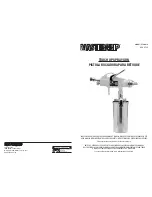
CLEANING AND MAINTENANCE
SPRAY GUN
1. Submerge the front end of the gun in solvent just until the fluid connection is covered.
2. Paint that has built up on the gun should be removed using a bristle brush and solvent.
3. Never submerge all of the spray gun in solvent. This will dissolve the lubricant in the leather
packing and on wear surfaces, causing them to dry out and resulting in difficult operation and
faster wear. Air passages in the gun will become clogged with dirty solvent.
4. Using a rag moistened with solvent, wipe down the outside of the gun.
5. Oil gun daily. Use a drop of lightweight machine oil on:
A. External Needle Pack Adjustment (Packing Nut)
See FIGURE 1 on page 3 for location of above point.
WHEN USED WITH SIPHON CUP
A compatible thinner or solvent should be
siphoned through gun by inserting tube in
open container of that liquid. Trigger gun
repeatedly to flush passageway thoroughly
and to clean tip of needle.
WHEN USED WITH PRESSURE TANK
Shut off air supply to tank and release pressure
on tank. Open vent and loosen air nozzle. Hold
a piece of cloth over the air nozzle and squeeze
trigger. Air will back up through fluid nozzle,
and force fluid out of hose into tank. Next, put
enough thinner into tank to wash hose and gun
thoroughly. Spray thinner through the gun until
it is clean. Attach fluid hose to air line and blow
it out thoroughly to remove all traces of materials
and dry hose.
AIR PRESSURE
Oil and water extractor is important.
Achieving a fine spray finish without the use of a good oil and water extractor is virtually impossible.
The extractor eliminates blistering and spotting by keeping air free of oil and water and gives precise
air pressure control at the gun.
AIR NOZZLE, FLUID NOZZLE, AND NEEDLE ASSEMBLY
1. All nozzles and needles are precision made and should be handled with care.
2. Except as described in #5, do not make any alterations to the gun.
3. To clean nozzles, soak them in solvent to dissolve any dried material. Afterwards, blow the
nozzles clean with air.
4. Do not probe any of the holes in the nozzles with metal instruments. If probing is necessary,
use only a tool that is softer than brass.
5. Adjust the fluid needle valve so when gun is triggered, air flow occurs before fluid flow.
SERVICE
• Tool service must be performed only by qualified repair personnel. Service or maintenance performed
by unqualified personnel could result in a risk of injury.
• When servicing a tool, use only identical replacement parts. Follow instructions in the MAINTENANCE
section of this manual. Use of unauthorized parts or failure to follow Maintenance Instructions may
create a risk of electrical shock or injury.
9
8
DO NOT USE LUBRICANTS CONTAINING SILICONE.
SILICONE MAY CAUSE DEFECTS IN THE FINISH APPLICATION.
ALL PARTS ON A SPRAY GUN SHOULD BE SCREWED IN BY HAND AT FIRST.
THIS WILL AVOID THE POSSIBILITY OF CROSS THREADING THE PARTS. IF THE PARTS
CANNOT BE TURNED BY HAND EASILY, MAKE SURE YOU HAVE THE CORRECT PARTS,
UNSCREW, REALIGN, AND TRY AGAIN.
NEVER
USE UNDUE FORCE IN MATING PARTS.
•
RESPONSIBILITY.
IT SHALL BE THE TOOL OWNER'S RESPONSIBILITY TO ASSURE THAT TOOLS ARE
MAINTAINED IN A SAFE OPERATING CONDITION. IF TOOLS ARE DAMAGED, REMOVE FROM SERVICE
IMMEDIATELY.
•
REPAIRS.
TOOLS SHALL BE DISCONNECTED FROM THEIR COMPRESSED AIR SUPPLY BEFORE
REPAIR IS ATTEMPTED. REPAIRS SHALL BE CONSISTENT WITH MANUFACTURER'S RECOMMENDED
PROCEDURES. PLEASE REFER TO CLEANING AND MAINTENANCE OR TROUBLESHOOTING SECTIONS.
•
REPLACEMENT.
TOOLS, HOSES AND FITTINGS SHALL BE REPLACED IF UNSUITABLE FOR SAFE
OPERATION.
Thinner
Keep thinner level
before packing
































